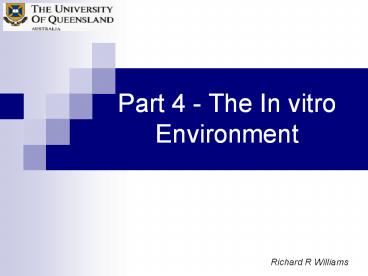Part 4 - The In vitro Environment - PowerPoint PPT Presentation
1 / 36
Title:
Part 4 - The In vitro Environment
Description:
photosynthesis. Heterotrophic. Mixotrophic. Autotrophic. CO2 limiting in closed system: ... Photosynthesis. sucrose. light. gas exchange (CO2) chlorophyll. Root ... – PowerPoint PPT presentation
Number of Views:115
Avg rating:3.0/5.0
Title: Part 4 - The In vitro Environment
1
Part 4 - The In vitro Environment
Richard R Williams
2
Control of plant growth
3
Manipulate the Environment to
- Control plant development
- Optimise growth rate
- maximise for production
- restrict for storage
- Optimes morphology
- Maintain plant quality
- Acclimatize plants
4
Characteristics of the In vitro
Environment
- The same set of environmental factors but
- Limited volume
- Initially defined
- Controlled
- Plant in vitro generally more sensistive.
5
Environmental factors
6
Culture room ecosystem
Culture vessel ecosystem
Kozai Smith 1994
7
The Aerial Environment
- Physical
- Light
- Temperature
- Gaseous composition
- Water vapour / humiditiy
- Gad diffusivity
- Pressure
- Chemical
- Biological
8
Light
9
Light
10
Typical light intensities
-
?mol.m-2s-1 - Typical fluoro PFD 10 - 50
- Compensation point 20
- Autotrophic cultures 65 - 250
- Glasshouse 100 - 1500
- Sunlight 2000
11
Light
12
The light (energy) spectrum
13
Light
Photon flux
- Quantity
PPFD - ?mol.m-2 s-1
- Quality
Spectrum
14
Carbohydrate supply in vitro
15
CO2 limiting in closed system
Fujiwara and Kozai 1995
16
Photo-inhibition
- PPFD beyond capacity to absorb
- Damage reduces p/s capacity further
- Avoid by
- - only short exposure at high PPFD
- - reduce sugar levels
- - filter blue light
17
Light direction
(From Kozai et al)
18
Light x hormone responses
19
Carry over of light effect ex vitro
20
Temperature
21
Typical culture temperatures
22
Effect of temp. on Citrus callus
23
Warmer temperatures for roots
24
Humidity
25
Humidity and stomates
26
The Root Environment ...
- Physical
- Temperature
- Water potential
- osmotic matric pressure
- Diffusivty of medium components
- Hardness / compactness of medium
- Light
27
The Root Environment ..
- Chemical
- Macroelements
- Microelements
- Dissolved gases
- Organic elements
- pH
28
Media Components ..
- Minerals - macro - micro
Sugar - Organic growth factors - amino
acids, vitamins - Growth regulators - auxins
cytokinins - Gelling agent
- Other additives - antioxidants,
absobants
29
(No Transcript)
30
Factors affecting mineral supply
- Concentration in the medium
- Mixture - precipitation
- pH
- Gelling agent
- Plant size and growth rate
- Plant tissue content
31
Media Components ..
- Minerals - macro - micro
- Sugar
- Organic growth factors - amino
acids, vitamins - Growth regulators - auxins
cytokinins - Gelling agent
- Other additives - antioxidants,
absobants
32
Complicating factors!
- Water availability
- Interaction between ions
- Necessary vs luxury uptake
- Changes over time
33
The Root Environment ..
- Biological
- Pathogens
- Non-pathogens
- symbiotic vs competitive
- The explant
34
Changes in media over time...
- Genetic (somatic) variability
- Habituation to growth regulators
- Exhaustion of some nutrients
- Accumualtion of toxins
- Photochemical changes
- ph changes
- Water availability
35
Acclimatization
- Water balance
- cuticle
- stomate function
- lack of roots
- Photosynthesis
- sucrose
- light
- gas exchange (CO2)
- chlorophyll
- Root growth function
- Pathogens (latent)
36
End of part 4































